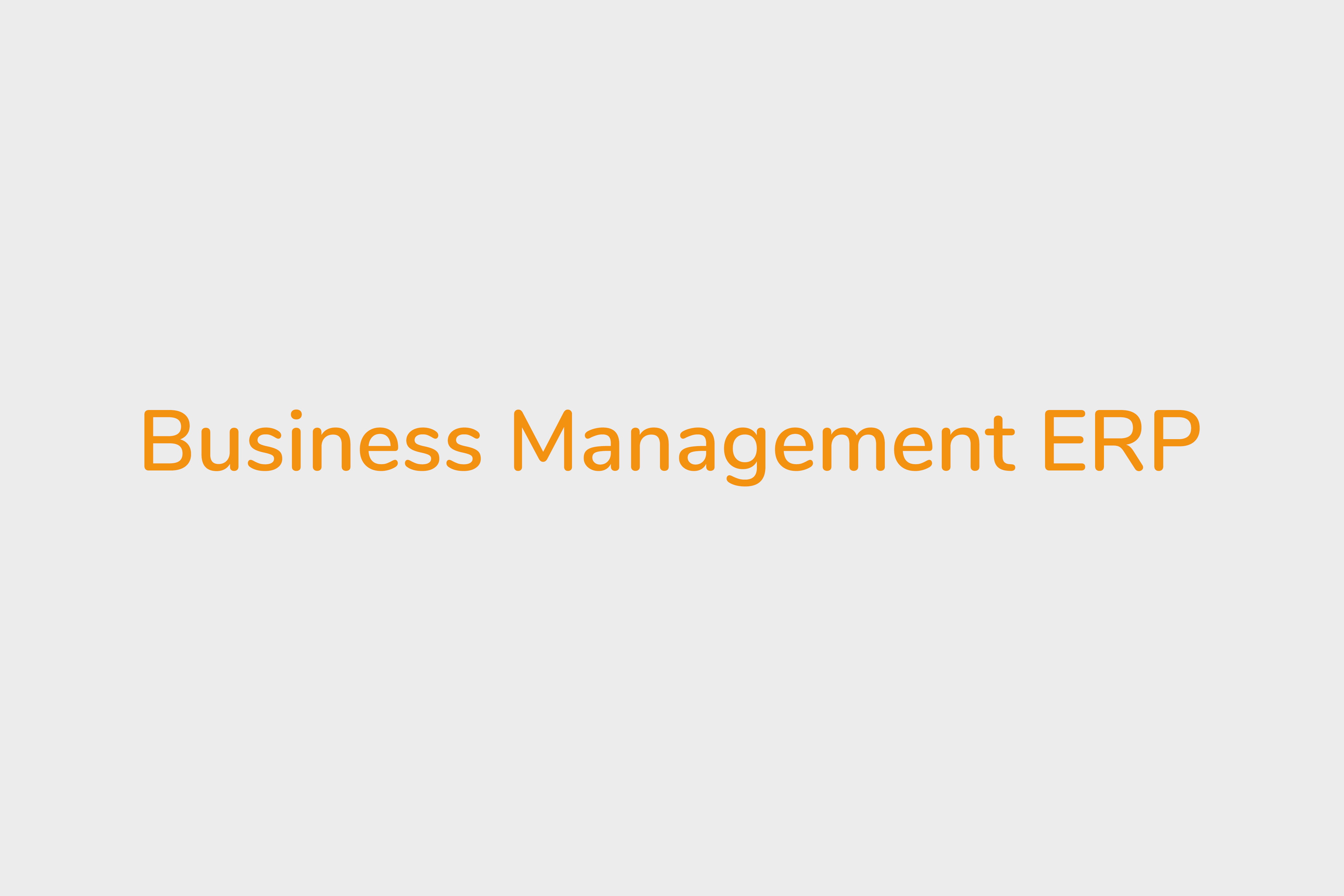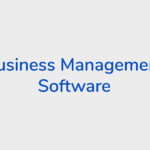Business management ERP
In today’s fast-paced business world, managing operations can be challenging, especially when you’re dealing with multiple departments and processes. That’s where an Enterprise Resource Planning (ERP) system comes in handy. An Business management ERP is a software solution that integrates all aspects of your business operations into a single, comprehensive system. It can help you manage your finances, inventory, procurement, HR, and more. In this blog, we will discuss the benefits of business management ERP and how it can help your organization.
Benefits of Business Management ERP
Streamlined Operations
With an ERP, you can manage all aspects of your business operations from a single platform, eliminating the need for separate software for each function. It streamlines business processes by automating routine tasks, reducing manual errors, and improving operational efficiency.
Improved Collaboration
An ERP system enables better collaboration between different departments by providing access to real-time data. It facilitates communication, enabling team members to share data, documents, and information easily.
Enhanced Decision-making
An ERP system provides access to real-time data and analytics, enabling better decision-making. It provides insights into business operations, allowing you to identify areas of improvement and make informed decisions.
Scalability
An ERP system can scale as your business grows. It can handle increased transaction volumes, support new business processes, and accommodate additional users.
Increased Efficiency
An ERP system automates routine tasks, reducing the time and effort required to complete them. It improves productivity and allows employees to focus on more important tasks.
Cost Savings
Implementing an ERP system can save your business money in the long run. It reduces manual errors, eliminates duplicate data entries, and optimizes inventory management. It also reduces IT infrastructure costs by consolidating multiple systems into one.
How Business Management ERP Can Help Your Organization
Financial Management
An ERP system can help manage financial processes, such as accounting, budgeting, billing, and invoicing. It provides real-time financial data, allowing you to monitor cash flow, track expenses, and forecast revenue.
Inventory Management
An ERP system can help manage inventory, reducing stockouts and overstocking. It provides real-time inventory data, enabling you to track inventory levels, reorder products, and manage supply chain processes.
Human Resource Management
An ERP system can help manage HR processes, such as employee data, payroll, benefits, and performance management. It provides real-time data, enabling you to manage employee data, track attendance, and monitor employee performance.
Procurement Management
An ERP system can help manage procurement processes, such as sourcing, ordering, and vendor management. It provides real-time data, enabling you to manage vendor relationships, track purchases, and optimize procurement processes.
In conclusion, an ERP system can help your organization streamline operations, improve collaboration, enhance decision-making, scale efficiently, increase efficiency, and save costs. It can help manage finances, inventory, human resources, and procurement processes, enabling you to focus on growing your business. By implementing an ERP system, you can gain a competitive advantage, improve customer satisfaction, and increase profitability.

What is business management in ERP?
Enterprise Resource Planning (ERP) is a software system that integrates various business functions into a single system to streamline operations and improve business efficiency. Business management is an essential component of an ERP system, and it plays a crucial role in the success of any organization.
Business management in ERP refers to the set of tools and techniques used to manage the business processes within an organization. These processes may include finance, accounting, supply chain management, customer relationship management, and human resources management. ERP business management software helps to automate and manage these processes, allowing organizations to run more efficiently and effectively.
ERP business management software offers many features that help organizations manage their business processes more effectively. Some of the key features include
Financial Management
ERP software provides organizations with the tools to manage their financial processes, such as accounting, budgeting, and forecasting. This helps to ensure that the organization's financial operations are efficient and accurate.
Supply Chain Management
ERP software helps organizations manage their supply chain processes, such as procurement, inventory management, and logistics. This helps to ensure that the organization's supply chain operations are efficient and cost-effective.
Customer Relationship Management
ERP software provides organizations with tools to manage their customer relationships, such as sales and marketing automation, customer service, and support. This helps to ensure that the organization's customers are satisfied and loyal.
Human Resources Management
ERP software helps organizations manage their human resources processes, such as recruitment, performance management, and payroll. This helps to ensure that the organization's human resources operations are efficient and effective.
Overall, ERP business management software helps organizations manage their business processes more effectively, improving efficiency, reducing costs, and increasing profitability. It provides a comprehensive view of the organization's operations, helping to identify areas for improvement and optimize business processes. By implementing ERP business management software, organizations can achieve greater success and growth in today's competitive business environment.
What are the 3 common types of ERP?
Enterprise Resource Planning (ERP) systems are a vital tool for many businesses. They help to streamline operations, improve productivity, and provide better visibility into the company's overall performance. There are several different types of ERP systems available in the market, each designed to cater to specific industries and business needs. In this blog, we will discuss the three common types of ERP systems.
On-premise ERP
On-premise ERP is the traditional form of ERP software, where the software is installed and runs on the company's own hardware and infrastructure. This type of ERP system is expensive as it requires a significant upfront investment in infrastructure, hardware, and software licenses. On-premise ERP systems provide complete control over the software and data, and companies can customize it according to their specific business requirements. This type of ERP system is best suited for companies that have large IT departments and can afford to invest in the infrastructure and resources required to maintain an on-premise ERP system.
Cloud ERP
ERP systems are becoming increasingly popular due to their affordability, flexibility, and ease of use. In this type of ERP system, the software is hosted on the cloud by the vendor, and companies access it through a web browser. Cloud ERP systems do not require any upfront investment in infrastructure and hardware, and companies can pay for only the resources they need. This type of ERP system is best suited for small and medium-sized businesses that do not have large IT departments and cannot afford to invest in expensive infrastructure.
Hybrid ERP
Hybrid ERP systems combine the best of both on-premise and cloud ERP systems. In this type of ERP system, some parts of the software are installed and run on the company's own hardware and infrastructure, while other parts are hosted on the cloud by the vendor. This type of ERP system provides companies with the flexibility to choose which parts of the system they want to keep on-premise and which parts they want to host on the cloud. Hybrid ERP systems are best suited for companies that have complex business requirements and need the customization and control of an on-premise ERP system, as well as the scalability and flexibility of a cloud ERP system.
In conclusion, ERP systems are a critical tool for businesses, and choosing the right type of ERP system is essential to ensure that it meets the specific needs of the business. On-premise, cloud, and hybrid ERP systems are the three common types of ERP systems available in the market, and each has its own advantages and disadvantages. Companies should carefully evaluate their business requirements, IT resources, and budget before choosing the type of ERP system that is right for them.
What are the benefits of ERP?
Enterprise Resource Planning (ERP) is a software solution that merges different business operations and functions into a single system. ERP systems are designed to streamline and optimize a wide range of business operations, from finance and accounting to inventory management, human resources, and more. In this blog post, we will discuss the benefits of ERP and how it can help your organization achieve its goals.
Improved Efficiency
One of the primary benefits of ERP is improved efficiency. With all your business processes integrated into a single system, you can streamline operations, automate tasks, and reduce the need for manual intervention. This leads to fewer errors and faster processing times, resulting in improved efficiency across the organization.
Better Decision Making
ERP systems deliver real-time data and analytics, which can be used to create informed conclusions. With access to accurate and up-to-date information, decision-makers can quickly analyze trends, identify areas for improvement, and make informed decisions that can help the organization achieve its goals.
Enhanced Collaboration
ERP systems provide a centralized platform that enables better collaboration among employees. With all business data in one place, employees can work together more efficiently, share information, and collaborate on projects, regardless of their location or department.
Improved Customer Satisfaction
ERP systems can help improve customer satisfaction by providing faster response times, accurate order processing, and improved delivery times. This can guide to improved client commitment and repeat business.
Reduced Costs
ERP systems can help reduce costs by streamlining business processes, automating tasks, and reducing the need for manual intervention. This can result in fewer errors, less waste, and lower operating costs.
Better Compliance
ERP systems can help organizations meet regulatory compliance requirements by providing real-time monitoring and reporting. This can help ensure that the organization is compliant with applicable laws and regulations, reducing the risk of fines, penalties, and legal action.
Scalability
ERP systems are designed to be scalable, meaning they can grow and adapt as your business grows. This can help organizations save money in the long run by avoiding the need for expensive software upgrades or replacements.
In conclusion, ERP systems offer a wide range of benefits, from improved efficiency and better decision-making to enhanced collaboration, improved customer satisfaction, and reduced costs. By implementing an ERP system, your organization can streamline operations, increase productivity, and achieve its goals more effectively.
What is an ERP system?
Enterprise Resource Planning (ERP) is a software system designed to manage and integrate the key functions of an organization. ERP is used by companies of all sizes, from small businesses to large corporations, to streamline their operations and optimize their performance. In this blog, we will discuss what an ERP system is, how it works, and the benefits it can bring to a business. What is an ERP system? An ERP system is a software solution that provides a central database for all the information needed to manage the different business functions of an organization, including finance, human resources, procurement, inventory management, manufacturing, and supply chain management. ERP software can automate many of the routine and manual tasks that were previously performed by different departments, enabling the organization to operate more efficiently. How does an ERP system work? An ERP system works by collecting data from different departments and consolidating it into a single database that can be accessed by authorized users. This central repository of data provides real-time visibility into the organization's operations, enabling managers to make informed decisions based on accurate, up-to-date information. ERP software typically has a modular structure, with each module dedicated to a specific business function. The modules can be customized to meet the specific needs of an organization, and new modules can be added as the business grows or as new requirements emerge.
Benefits of an ERP system Implementing an ERP system can bring many benefits to an organization, including
Improved efficiency
ERP software can automate many manual processes, reducing the time and effort required to complete routine tasks. This can help employees work more efficiently and free up time for more strategic activities.
Better decision-making
With a central repository of data, managers can access real-time information on key business metrics, enabling them to make informed decisions based on accurate data.
Enhanced collaboration
ERP software can facilitate collaboration between different departments, enabling them to work together more effectively to achieve common goals.
Increased agility
ERP software can help organizations respond more quickly to changes in the market or business environment by providing real-time visibility into operations and enabling managers to make informed decisions.
Improved customer service
By providing real-time visibility into inventory levels, order status, and other key metrics, ERP software can help organizations provide better customer service and respond more quickly to customer inquiries and requests.
Conclusion In summary, an ERP system is a software solution that provides a central database for managing and integrating the key functions of an organization. By automating manual processes, providing real-time visibility into operations, and facilitating collaboration between departments, an ERP system can help organizations operate more efficiently and make better-informed decisions. Implementing an ERP system can bring many benefits to a business, including improved efficiency, better decision-making, enhanced collaboration, increased agility, and improved customer service.
Is ERP and SAP same?
Enterprise Resource Planning (ERP) and SAP are two terms that are often used interchangeably, but they are not the same thing. ERP refers to a software system that is designed to help organizations manage their business processes more effectively. SAP, on the other hand, is one of the most popular ERP software systems used by businesses today.
To understand the difference between ERP and SAP, it's important to first understand what ERP software does. ERP software is designed to integrate and streamline all of a company's business processes into a single, comprehensive system. This includes everything from inventory management and supply chain management to financials, human resources, and customer relationship management. ERP software is intended to break down the barriers between departments and enable a more holistic view of the organization's operations.
SAP is a specific type of ERP software developed by the German company SAP SE. It is one of the most widely used ERP systems in the world and is known for its robust features and ability to support complex business processes. SAP is used by businesses of all sizes, from small startups to large multinational corporations, across a wide range of industries.
While SAP is a specific type of ERP software, there are many other ERP systems available on the market, each with its own unique features and capabilities. Some of the other popular ERP systems include Oracle, Microsoft Dynamics, and Infor. To further understand the differences between ERP and SAP, it's worth noting that ERP software is a broader category that includes a variety of different software applications, including SAP. ERP systems are typically designed to be modular, meaning that organizations can pick and choose which modules they want to use, depending on their specific needs. These modules can be customized to meet the unique needs of the organization and can be integrated with other software systems already in use.
SAP, specifically, is known for its robust features and capabilities, particularly in the areas of finance, supply chain management, and human resources. It offers a wide range of modules, including SAP S/4HANA for finance and accounting, SAP Ariba for procurement and supply chain management, and SAP SuccessFactors for human resources management. SAP also offers industry-specific solutions, such as SAP Retail for the retail industry and SAP Automotive for the automotive industry.
In summary, ERP and SAP are not the same things. ERP refers to a software system designed to help organizations manage their business processes more effectively, while SAP is a specific type of ERP software developed by the German company SAP SE. While SAP is one of the most popular ERP systems used by businesses today, there are many other ERP systems available on the market, each with their own unique features and capabilities.
Business Management Systems (GBMS)
Business Management Systems (BMS) are essential tools for organizations of all sizes and industries. These systems can help streamline and automate various business processes, including operations, finance, human resources, and more. In recent years, cloud-based BMS solutions have become increasingly popular due to their ease of use, scalability, and cost-effectiveness. In this blog, we will explore the benefits of cloud-based Global Business Management Systems (GBMS) and their impact on businesses.
GBMS is an integrated management system that provides companies with a centralized platform to manage their business processes. These systems enable businesses to automate and optimize their workflows, improve operational efficiency, and enhance collaboration between different departments. The cloud-based GBMS solutions are hosted on the internet and accessible through a web browser, eliminating the need for expensive hardware and IT infrastructure.
One of the most significant advantages of GBMS is its scalability. Cloud-based systems allow businesses to expand or reduce their operations quickly, without the need for extensive IT support. This means that organizations can adapt to changing market conditions, manage seasonal fluctuations, and respond to growth opportunities more effectively.
Another benefit of GBMS is that they provide real-time visibility into business operations. With cloud-based systems, businesses can access their data anytime, anywhere, and on any device, allowing them to make informed decisions quickly. The centralized data management feature of GBMS also makes it easier for organizations to maintain regulatory compliance and respond to audit requirements. GBMS also helps businesses reduce their operational costs. By automating routine tasks and workflows, organizations can minimize the need for manual labor and free up resources for other critical tasks. Additionally, cloud-based systems eliminate the need for on-site IT infrastructure, reducing hardware and maintenance costs.
The cloud-based GBMS solutions also offer enhanced security features to protect sensitive business data. These systems are equipped with advanced security protocols, encryption, and multi-factor authentication, making them less vulnerable to cyber threats and data breaches.
In conclusion, cloud-based GBMS systems are essential tools for modern businesses. These systems help organizations streamline their operations, improve efficiency, and reduce costs. They provide real-time visibility into business operations, which enables companies to make informed decisions quickly. Furthermore, cloud-based GBMS solutions are scalable, cost-effective, and equipped with advanced security features, making them a practical choice for businesses of all sizes and industries.


